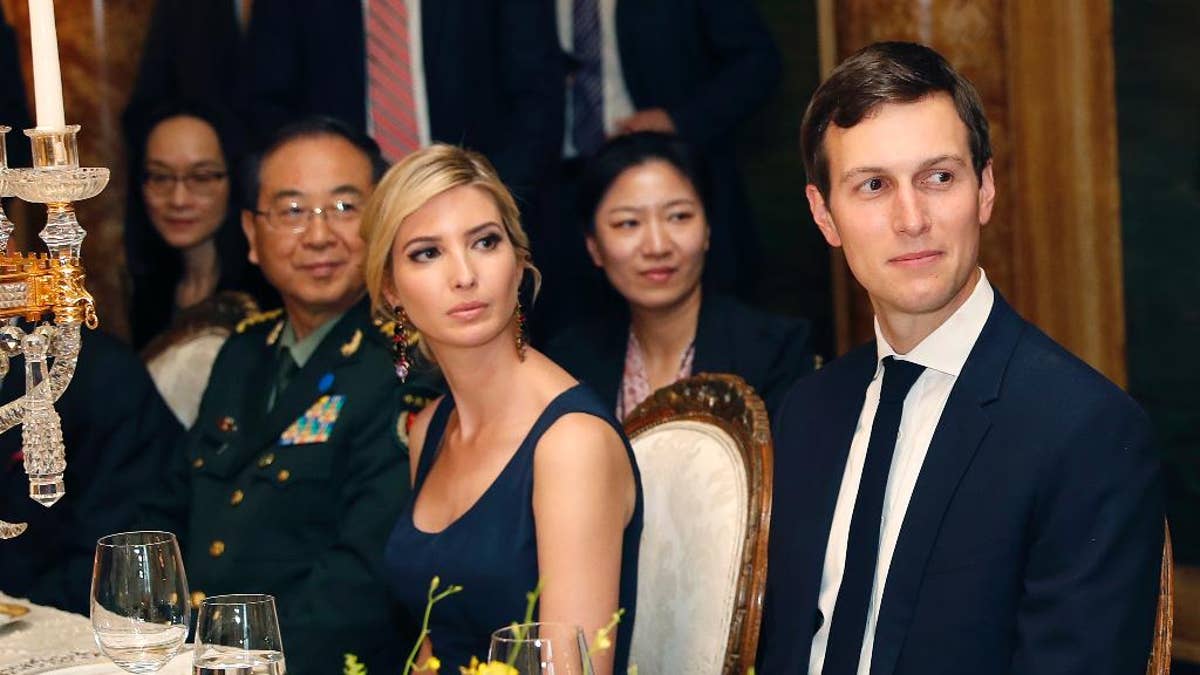
FILE - In this Thursday, April 6, 2017, file photo, Ivanka Trump, second from right, the daughter and assistant to President Donald Trump, is seated with her husband White House senior adviser Jared Kushner, right, during a dinner with President Donald Trump and Chinese President Xi Jinping, at Mar-a-Lago, in Palm Beach, Fla. China's Ministry of Foreign Affairs spokesman Lu Kang on Wednesday defended the handling of the applications of the trademarks won by U.S. President Donald Trump’s daughter Ivanka and her company, saying that all such requests are handled fairly. (AP Photo/Alex Brandon, File) (The Associated Press)
BEIJING – China is defending its handling of trademark applications from President Donald Trump's daughter Ivanka and her company, saying that all such requests are handled fairly.
Ministry of Foreign Affairs spokesman Lu Kang was asked about the trademarks Wednesday, a day after The Associated Press reported that Ivanka Trump had won provisional approval for at least five marks since her father's January inauguration. Three of those approvals were granted April 6, the day Ivanka Trump and her husband sat next to Chinese President Xi Jinping and his wife for dinner at Trump's Mar-a-Lago resort in Florida.
Lu said that China follows the law in granting trademarks and "the principle of giving equal protection to foreign trademark holders."
Asked about the timing of the April 6 approvals, Lu said: "There are perhaps some media engaging in hyping certain gossip to hint at something undisclosed. I can tell you that they will never succeed."
Beyond the provisionally approved trademarks, Ivanka Trump Marks LLC has 16 registered trademarks in China and more than 30 pending applications, according to China's Trademark Office database. They collectively cover a wide range of goods and services, including cosmetics, jewelry, leather handbags, luggage, clothes, shoes, retail, spa and beauty services. Other countries where the company has pending and registered trademarks include Japan, Mexico, Turkey, Israel, Canada and Saudi Arabia.
Sales of Ivanka Trump's brand, which she no longer manages but still owns, hit record levels in 2017 by some measures despite boycotts and several stores limiting her merchandise. U.S. imports, almost all from China, shot up an estimated 166 percent last year, according to Panjiva Inc., which tracks international imports to the United States.
In a statement Tuesday, a spokesperson for the Ivanka Trump brand said the 2017 Chinese trademarks were filed defensively to prevent counterfeiters or squatters from using her name.
Trump and her husband, Jared Kushner, are trusted advisers to the president. Criminal conflict-of-interest law prohibits federal officials from participating in government matters that could impact their own financial interest or that of their spouses. Some argue that the more Ivanka Trump's business broadens its scope, the more it threatens to encroach on the couple's ability to deliver credible advice on core issues like trade, intellectual property and the value of the Chinese currency.
Asked about Ivanka Trump's role in U.S.-China relations, Lu said: "We always think highly of the people who are committed to promoting China-U.S. friendship and cooperation, whether they are from the government or society, and we commend their efforts."
